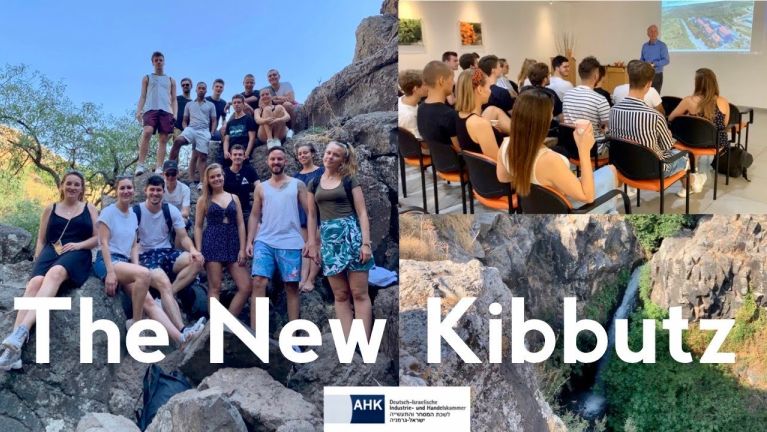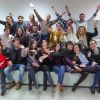Living a culture of innovation
The DAAD “New Kibbutz” scholarship brings students from Germany together with the Israeli start-ups scene.

Working as an up-and-coming software developer in the Israeli city of Petach Tikwa for a company that specializes in mobile data technology? Actively supporting the marketing department of a social impact start-up in Tel Aviv? Or helping a founding team in Ra’anana to take the first steps towards funding and publicity? These are just a few of the dozen internship positions that Liron Koll of the German-Israeli Chamber of Commerce and Industry (AHK) has compiled and published online as part of the “New Kibbutz” program. “We’re constantly approaching companies in Israel about openings”, she says, “and the feedback has been very good”. The start-ups scene in Israel is booming, and Israeli entrepreneurship is legendary worldwide. There is more than enough to do, also for motivated interns. “And many Israeli companies have already had excellent experiences with German students.”
Dieses YouTube-Video kann in einem neuen Tab abgespielt werden
YouTube öffnenThird party content
We use YouTube to embed content that may collect data about your activity. Please review the details and accept the service to see this content.
Open consent formThe “New Kibbutz” program has been around since 2015. It initially started regionally, initiated by the Israeli Consulate General for Southern Germany in Munich. “But then 'New Kibbutz' itself became a kind of start-ups”, says Hila Engelhard of the Israeli Embassy in Berlin. “First the beta phase, now the growth!” You can hear her enthusiasm on the phone. “For us, ‘New Kibbutz’ is an innovative diplomatic project, a great flagship enterprise.” Placing young people from Germany with young companies in Israel brings both countries closer together. “It’s about contact, working and experiencing things together.” During their stays, the Germans could “feel, smell and taste the exciting atmosphere of Israel’s high-tech scene, and learn to love this entrepreneurial energy.” The internship, she says, which lasts for several months, has for many of the previous participants proved to be a decisive, sometimes even life-changing, experience. And the companies also benefit from the knowledge, commitment and networks of their German interns.
For us, “New Kibbutz” is an innovative diplomatic project, a great flagship enterprise.
"New Kibbutz" re-started in early 2021 on a newer, larger scale; since then, it has been accessible to students from all over Germany and has also been combined with a comprehensive scholarship from the German Academic Exchange Service (DAAD). The DAAD lists the exact entry requirements at its scholarship database; among other things, students applying must be enrolled at a German university for at least the second semester. “Before you try to get a scholarship, which includes travel expenses, living expenses and an insurance package, you should first send your application to the AHK”, advises DAAD Head of Division Muhammad Khaskeia. A DAAD video explains the precise process:
Dieses YouTube-Video kann in einem neuen Tab abgespielt werden
YouTube öffnenThird party content
We use YouTube to embed content that may collect data about your activity. Please review the details and accept the service to see this content.
Open consent formAt the AHK, students can specify three favourites among the available internships. Koll then sees to the matching. “I make sure that students – they often come from business studies, computer science or engineering – are a good match for the company.” For her, it is also important that the applicants have a genuine interest in the country, the high-tech scene and the Israeli culture of innovation. Because this, she says, often leads to a win-win situation. “The several-months stays create long-term career opportunities for the Germans and long-term contacts in Germany for Israeli companies.”
Despite the pandemic, students in the starting blocks
Once the AHK has confirmed the internship, the documents can be submitted to the DAAD. Funding is granted for a period of at least two and a maximum of six months. “The Federal Ministry of Education and Research has a budget for at least 50 students in 2021”, says Khaskeia. The ministry has pledged a total of 3.5 million euros. At the end of April, more than 80 students have already applied. “We’re happy about the huge onrush and would be very happy to be able to develop the program further and extend into the next year.” Engelhard can also very well imagine an expansion if the students and companies continue to be interested: “We believe absolutely in ‘New Kibbutz’”.
Around twenty places for 2021 have now been awarded. Although so far it has hardly been possible to travel to Israel, AHK project manager Koll hopes that the first interns will soon be able to take up their positions. “Since Israel is already very far along with vaccination, it’s slowly returning to normal.” Because of the pandemic, the program partners have agreed on flexible solutions: “You can now easily postpone the time of the internship”, explains Koll, “or initially start ‘on remote’, or in other words, by working at home from Germany.” This, she admits, while not ideal, can at least serve as a transition until the journey really begins. Some students are already in the starting blocks.
https://israel.ahk.de/new-kibbutz/




